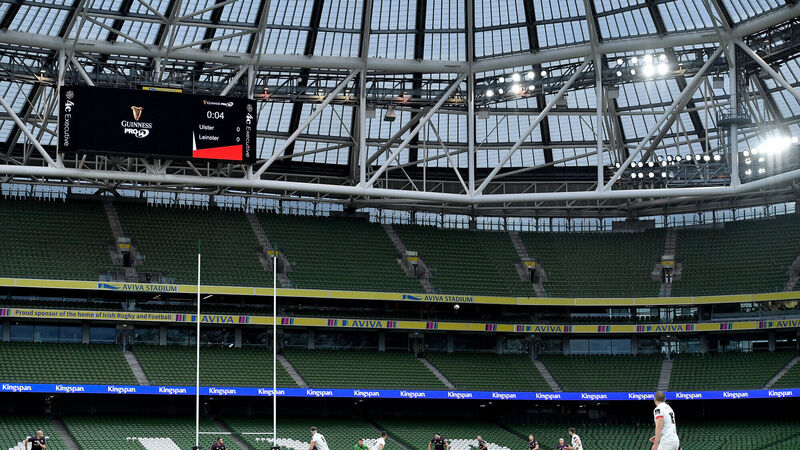Transmission has to go down 'sharply' before sporting events can be opened up, says DCU professor

Ross Byrne of Leinster kicks off the game in front of empty stands during the Guinness PRO14 Round 15 match between Ulster and Leinster at the Aviva Stadium in Dublin. Picture: Brendan Moran/Sportsfile
Immunology expert Professor Kingston Mills has said he does not understand why 500 spectators could not attend the forthcoming Leinster versus Saracens rugby game in the Aviva Stadium as the risks were “fairly minimal.”
Music events were being considered, he told RTÉ radio’s Today with Claire Byrne show, when indoor activities were “much more” conducive to the spread of the virus.
Why not allow small numbers of spectators at sporting events?, he asked.
There was less risk of transmission of the virus among well-spaced spectators in stadia than there was of people watching a sporting event on a television in a pub, he said.
However, professor of community health, Anthony Staines said that until community transmission number are down to manageable levels sporting events could not be opened up.
While he agreed that sport was a very important activity and had to be maintained “in any way we can”, he said that the figures for transmission of the virus had “to go down sharply” first.
Pubs needed to be managed properly, although most proprietors were adhering to the rules, some were misbehaving “seriously” and they needed to be regulated properly.
Players had an important role to play in reaching a younger audience who do not listen or read mainstream media and relied on social media for their information, he said.
The focus needed to be on schools, he said.
Prof Staines warned that unless numbers come under control, he was concerned there could be 40 to 50 cases in schools in the coming weeks.
He pointed out that hundreds of sports are played in Ireland and there would need to be different rules for all of them.
There was a big difference between an All-Ireland final and a local club game, he said, it was hard to make the rules consistent.
Prof Mills said he wanted more details on the cases linked to sport – was it players or spectators and if spectators, had they been at the event itself or watching it in a pub?
It was safer for 50 to 100 people to watch a game in a stadium rather than in a pub.
It would be reducing the risk to allow spectators to watch a game in a stadium if they were kept well apart.
Clubs had a big role to play in such management, he added.





